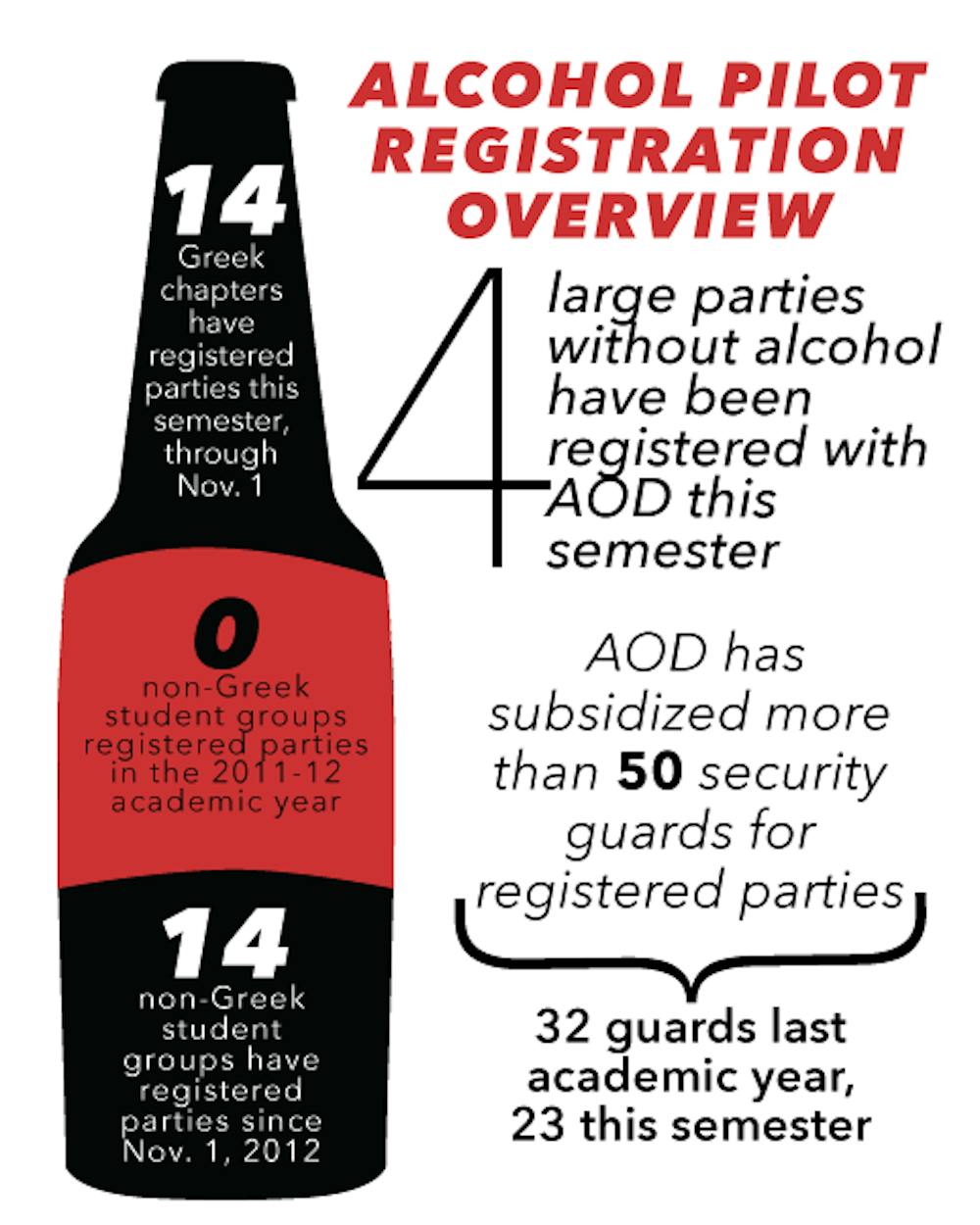
While the alcohol pilot program had originally been approved for one year only, administrators say that the program has showed promise over the past 12 months and was worth extending into a second year.
A new pilot program that allows some on-campus events to serve hard alcohol has been extended into a second year.
Since the alcohol pilot began last November, 14 non-Greek student organizations — the program’s primary target — have registered on-campus parties through the Office of Alcohol and Other Drug Program Initiatives. Fourteen Greek chapters have registered parties under the pilot so far this semester, through Nov. 1.
The pilot, designed to boost party registration numbers campus-wide, has opened up several on-campus spaces — including Houston Hall, Rodin College House and the LGBT Center — for events with alcohol. Under the pilot, registered parties with less than 150 attendees are allowed to serve certain types of hard alcohol, in the form of mixed drinks. Previously, students who hosted registered events were limited to beer or wine service only.
Related: Penn approves new alcohol pilot program
While the pilot had originally been approved for one year only, administrators say that the program has showed promise over the past 12 months and was worth extending into a second year.
“The way I’m viewing it is that last year was a great year,” AOD Director Julie Lyzinski Nettleton said. “We worked through a lot of the kinks of the pilot last year, and now we’re really starting to ramp our efforts up.”
The core objective of the pilot, Nettleton said, is social equity — leveling the playing field between Greek and non-Greek organizations by making more on-campus spaces available for events with alcohol. Although Greek party registration numbers have remained fairly stable since the pilot began last year, Nettleton said she has been pleased by the number of nontraditional student groups that have registered parties.
Related: Campus sounds off on new alcohol pilot program
The list of non-Greek organizations that have used the pilot is diverse: honor societies, cultural groups and college house residential programs, among others, have all registered parties with AOD since the pilot went into effect.
“We weren’t even engaging any of these groups outside the Greek community before the pilot,” Nettleton said. “The span of diversity we’ve seen, from 0 to 14 non-Greek registrations in one year, has been the biggest success we’ve seen so far, hands down.”
As part of the pilot, Nettleton’s office has subsidized the cost of more than 50 security guards for registered parties over the past year — 32 guards last academic year, and 23 so far this semester. The security subsidies are part of a larger push by the University to bring more off-campus parties to on-campus, regulated spaces.
The pilot will likely be a major point of focus in a report on campus alcohol use that the administration-led Commission on Student Safety, Alcohol and Campus Life is expected to release later this year. It is possible that the commission, which has been meeting since early last semester, could recommend writing the pilot into the University’s full alcohol and drug policy.
Related: Penn creates new alcohol commission
AOD has been generally pleased with the pilot’s first year, but some student leaders say that challenges remain. Wharton junior Christian Cortes, the Undergraduate Assembly’s student life committee director, said he believes that the pilot, while a step in the right direction, needs to be marketed more widely throughout the student body.
“I’d agree that this is a really fantastic program, but I think there are a lot of groups that still don’t even know there’s a program like this in place,” he said.
Cortes attended an event at the LGBT Center last semester that had been registered with AOD. Students over 21 at the event were allowed to drink. “That didn’t make the event unsafe or rowdy,” Cortes said, adding that being allowed to drink in a campus building “brought more people together who otherwise probably wouldn’t have even attended.”
Because the pilot allows registered events with more than 150 attendees to serve beer and wine only, it has been difficult for some Greek chapters that frequently register larger parties to serve mixed drinks at their events, said College senior Andrew Turell, president of the Interfraternity Council.
Despite the difficulties for some Greek chapters, Turell called the pilot’s rollout over the past year a “great first step” overall.
Related: Alcohol review set to begin next week
Rodin College House Dean Ryan Keytack agreed that the pilot has been a positive move. Over the past year, Rodin has registered two parties in its rooftop lounge under the pilot.
“The idea that we should allow student groups on campus to partner to throw fun, entertaining and appropriate parties makes a lot of sense to me,” Keytack said, “and that’s what this pilot is trying to do.”
The Daily Pennsylvanian is an independent, student-run newspaper. Please consider making a donation to support the coverage that shapes the University. Your generosity ensures a future of strong journalism at Penn.
DonatePlease note All comments are eligible for publication in The Daily Pennsylvanian.








